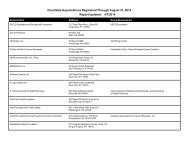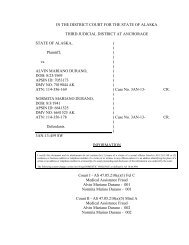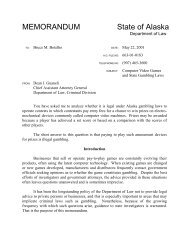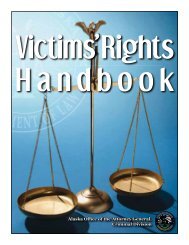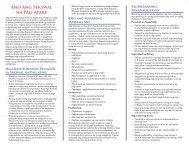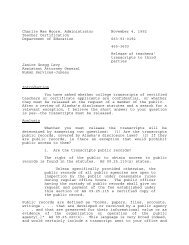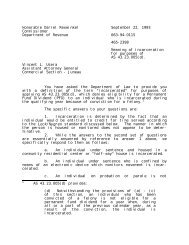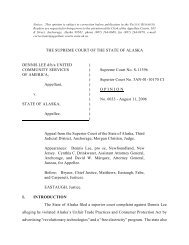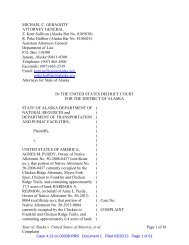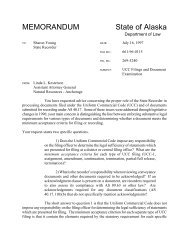Initial Report and Recommendations - Alaska Department of Law
Initial Report and Recommendations - Alaska Department of Law
Initial Report and Recommendations - Alaska Department of Law
- No tags were found...
You also want an ePaper? Increase the reach of your titles
YUMPU automatically turns print PDFs into web optimized ePapers that Google loves.
Executive SummaryCreated by Congress in 2004 (Public <strong>Law</strong> 108-199), the <strong>Alaska</strong> Rural Justice <strong>and</strong> <strong>Law</strong>Enforcement Commission is charged with the task <strong>of</strong> studying four broad areas related to rural<strong>Alaska</strong>: law enforcement, judicial services, alcohol importation <strong>and</strong> interdiction, <strong>and</strong> domesticviolence <strong>and</strong> child abuse. Meetings <strong>and</strong> public hearings were held from early October 2004through June 2005, <strong>and</strong> the Commission also established four workgroups <strong>of</strong> pr<strong>of</strong>essionals,experts, <strong>and</strong> <strong>of</strong>ficials working in fields related to these four topics, numbering 50 <strong>Alaska</strong>ns in all.The workgroups met weekly from January 2005 through April 2005 <strong>and</strong> developed over 100options that the Commission reviewed. In reviewing these options, the Commission alsoconsidered the many hours <strong>of</strong> public testimony <strong>of</strong>fered in hearings held across <strong>Alaska</strong>. Theoptions it adopted were organized into one <strong>of</strong> the following nine general recommendations.1. Engage in More Partnering <strong>and</strong> CollaborationOne <strong>of</strong> the most significant outcomes <strong>of</strong> the Commission’s work was engenderingcollaboration among a broad spectrum <strong>of</strong> stakeholders in trying to address the four issues beforethe Commission. In order to continue the dialogue, this Commission recommends that its workcontinue for the next three to five years. Given the dearth <strong>of</strong> resources <strong>and</strong> the daunting nature <strong>of</strong>the problems facing rural <strong>Alaska</strong>, the Commission urges more collaboration among the variousgovernments involved. It specifically recommends collaboration on developing a number <strong>of</strong>agreements that will better coordinate law enforcement <strong>and</strong> judicial services in rural <strong>Alaska</strong>.2. Make Systemic Changes to Improve Rural <strong>Law</strong> EnforcementResponding to its first charge, the Commission <strong>of</strong>fers several recommendations toimprove law enforcement in rural <strong>Alaska</strong>, including the development <strong>of</strong> a statewide, uniform, <strong>and</strong>tiered system <strong>of</strong> certification <strong>and</strong> training for police <strong>and</strong> public safety <strong>of</strong>ficers with a reasonableopportunity for advancement that could culminate in qualifications to seek full police certificationby the <strong>Alaska</strong> Police St<strong>and</strong>ards Council. It further recommends expansion <strong>of</strong> police <strong>and</strong> publicsafety training, changes in state law to help law enforcement reduce the importation <strong>of</strong> alcoholinto dry rural <strong>Alaska</strong> villages, <strong>and</strong> a ban on written order sales <strong>of</strong> alcoholic beverages to “dry” or“damp” communities. 33. Enlarge the Use <strong>of</strong> Community-based SolutionsThe Commission was impressed with the public testimony <strong>and</strong> evidence thatdemonstrated the importance <strong>and</strong> success <strong>of</strong> approaches responding to the immediate <strong>and</strong> culturalneeds <strong>of</strong> communities that are locally driven. To this end, the Commission recommendsamending State statute to allow the Division <strong>of</strong> Juvenile Justice to delegate authority to tribes toenable the sharing <strong>of</strong> resources with respect to tribal juvenile <strong>of</strong>fenders, with other amendmentsto permit tribes to participate in juvenile proceedings <strong>and</strong> juvenile delinquency treatment. Itfurther recommends exp<strong>and</strong>ed funding to help non-pr<strong>of</strong>it organizations <strong>and</strong> rural <strong>Alaska</strong>communities develop new programs at the local level to increase prevention, intervention <strong>and</strong>treatment <strong>of</strong> domestic violence <strong>and</strong> child abuse. Housing <strong>Alaska</strong>’s inmates in out-<strong>of</strong>-statefacilities is a weak point in the State’s correctional system, <strong>and</strong> the Commission recommends thatthe <strong>Department</strong> <strong>of</strong> Corrections explore other options, including working with Native regionalcorporations, to keep inmates in <strong>Alaska</strong>. To help reduce the amount <strong>of</strong> alcohol reaching drycommunities, the Commission recommends the establishment <strong>of</strong> alcohol distribution centers,such as the one established in Barrow, in damp hub communities, restricting alcohol sales toresidents <strong>of</strong> those communities only.3A “dry” community is one in which alcohol may be neither sold nor possessed. A “damp” communityis one in which alcohol may not be bought or sold, but may be possessed.<strong>Alaska</strong> Rural Justice <strong>and</strong> <strong>Law</strong> Enforcement Commission - Page 4



